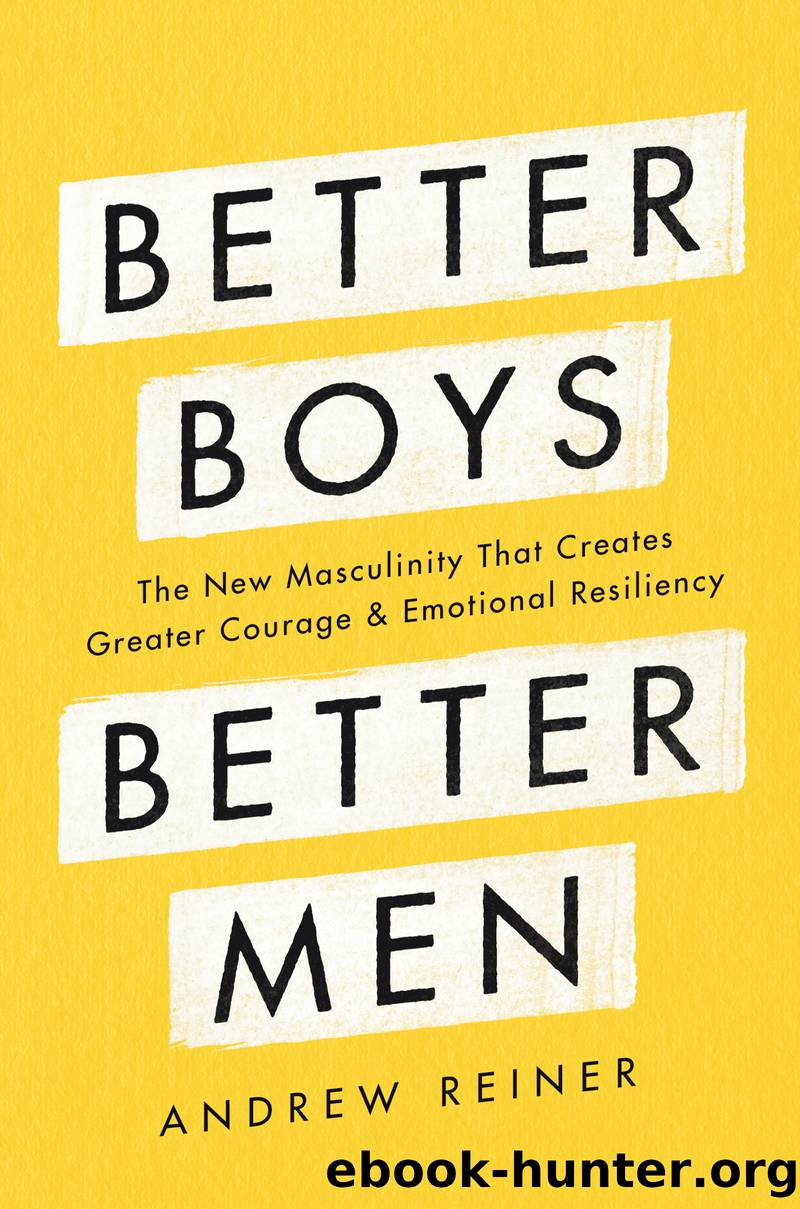Better Boys, Better Men by Andrew Reiner

Author:Andrew Reiner
Language: eng
Format: epub
Publisher: HarperOne
Published: 2020-09-12T00:00:00+00:00
Chapter Five
Men and VulnerabilityâA Crying Shame
As we walk across the quad, I am struck by the air. On this June evening in Norfolk, Massachusetts, the air is so dry I see detail in cloudsâpaint-brushed sweeps, swishes, and shadingâthat are uncommon in the muggy Mid-Atlantic where Iâm from. This clarifying air seems to hold sway over the campusâfrom the echo of the crows overhead that ricochets off the large stone dormitory walls to the laughter and chatter of the men walking past in their starched white T-shirts and long blue gym shorts. I hear and see everything, as if microphones and speakers are hidden everywhere.
Despite the disarming beauty and serenity of this moment, I keep my guard up. I am visiting the Massachusetts Correctional Institution (MCI) Norfolk, the largest medium-security prison in the Massachusetts correctional system. Only minutes before, I had been waiting in a section where new prisoners are admitted with eight volunteers from the Jericho Circle Project. A new prisoner, a tan and muscular man who wouldnât have looked out of place in the nearby bars in Cape Cod, eyed me and, for a split second, leaned in my direction. I startled back, and the corrections officer yanked the prisoner back by his handcuffs, just in case. The exchange was innocent enough, but it reminded me of something Jericho Circle founder Steven Spitzer told me earlier that evening. âAt any given time, one-third of these guys are lifers.â If that wasnât enough of a reminder that I was visiting a prison, the eight volunteers and I had to follow Spitzer through a steel silo, then through a transitional area leading to the quad called the âDead Zone,â a gardened area monitored by rifle-toting corrections officers in watch towers.
Iâm in prison to witness something that doesnât happen very much in the âreal worldâ: men talking about themselves and their lives with unflinching honestyâall in the presence of other men. They achieve this, from what Iâve read, through Jericho Circle, one of a small and growing number of programs in correctional facilities that encourage inmates to access a part of themselves that most of them abandoned long ago. For Spitzer, a former sociology academic who founded Jericho Circle twelve years ago, this means something unabashedly quixotic: âWeâre on a mission to help guys on the âinsideâ find something that many of them lost or were never allowed to have. Weâre trying to help them flip the masculinity scripts they were handed at a young age.â
An hour later, after navigating clearance in four different zones, we finally near the classrooms. I notice a library display featuring a string of novels and nonfiction books. They all contain the word âfatherhoodâ in their titles.
Itâs two days after Fatherâs Day.
I follow Larry Cotton, another longtime Jericho Circle veteran, into the classroom. Cotton is one of fifteen âoutsideâ men who volunteer at this prison. A retired structural engineer, Cotton has been meeting with these groups every week for ten years and resembles many of the older volunteers at Jericho: balding and paunchy, with a gauzy-eyed gentleness.
Download
This site does not store any files on its server. We only index and link to content provided by other sites. Please contact the content providers to delete copyright contents if any and email us, we'll remove relevant links or contents immediately.
I Have Something to Say by John Bowe(3500)
Einstein: His Life and Universe by Walter Isaacson(2022)
What Happened to You? by Oprah Winfrey(1767)
Doesn't Hurt to Ask by Trey Gowdy(1638)
Solutions and Other Problems by Allie Brosh(1329)
American Dreams by Unknown(1285)
Disloyal: A Memoir by Michael Cohen(1233)
The Silent Cry by Cathy Glass(1174)
Talk of the Ton by unknow(1059)
Infinite Circle by Bernie Glassman(1051)
Don't Call it a Cult by Sarah Berman(1039)
Group by Christie Tate(1035)
Home for the Soul by Sara Bird(1025)
Before & Laughter by Jimmy Carr(894)
The Book of Hope by Jane Goodall(872)
Ghosts by Dolly Alderton(868)
Severed by John Gilmore(867)
Total F*cking Godhead by Corbin Reiff(853)
Searching for Family and Traditions at the French Table by Carole Bumpus(822)
